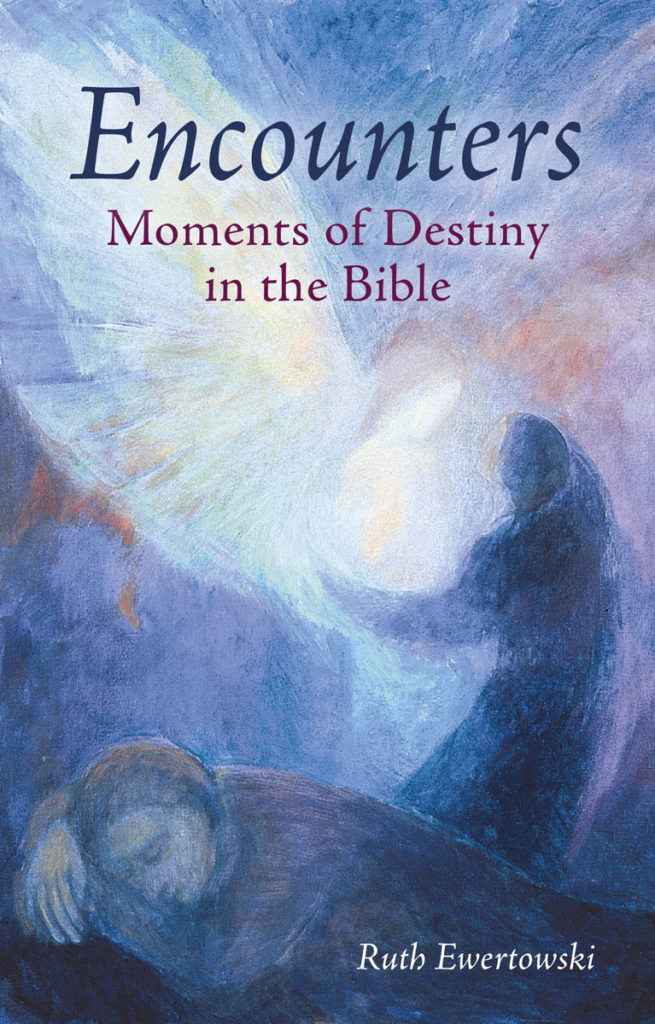Encounters: Moments of Destiny in the Bible
by Floris Books • 31 August 2023 • Extract, Religion • 0 Comments

Events in the Bible rarely follow an orderly course. For many of the figures whose stories it tells, their fortunes often turn, for good or bad, on important encounters with other people and with divine beings. In these moments of destiny, individuals discover something new and remarkable that changes the course of their lives.
In Encounters: Moments of Destiny in the Bible Ruth Ewertowski explores over 35 meetings described in the Old and New Testaments – from Joseph’s confrontation with his brothers, Moses’ encounter with God in the burning bush, the story of Rahab and the Israelite spies, the appearance of the Archangel Gabriel to Mary, and the profound encounters of ordinary people with Christ Jesus. Time and again Ewertowski shows how the weaknesses, setbacks and failures of the Bible’s all-too-human protagonists are brought into harmony with a divine plan.
In this extract, Ewertowski considers the role encounters in dreams play in the Bible narrative in the lives of Joseph, Solomon, Jacob and Daniel.
Dreams Change When Christ Appears
The dreams seventeen-year-old Joseph told his brothers and his father can only be thought of as wishful vanity dreams – his brothers’ sheaves of grain bowed before his, and even the sun, the moon, and eleven stars bowed down before him (Gen. 37:7–9). Although they were dreams that caused Joseph’s brothers to
resent him, they were nevertheless prophetic. But they were only fulfilled after Joseph had undergone profound humiliations.

What is special about the story is that these humiliations occurred because, in telling his dreams, Joseph had made such enemies of his brothers that they threw him into a dry well and sold him to merchants. These and other humiliations were the prerequisites for him to ascend by his own strength to a then ‘deserved’ elevation entirely corresponding to his dreams. Along that path of destiny he was helped by his ability to interpret dreams. While his own dreams had been all too self-explanatory, those of the cupbearer and the baker whom Joseph encountered in prison required interpretation. Joseph did not claim that art for himself but ascribed it to God alone (Gen. 40:8; 41:16). Joseph could predict the restoration of the cupbearer to his office, but he had to announce the baker’s execution. He interpreted without thinking and with a determination that was supposed to testify to his relationship with God. He also interpreted Pharaoh’s dream of the fat and lean cows so plausibly that he was promoted as Egypt’s
second most powerful man. He was thus on the way to fulfilling his boyhood dreams.
The people of the Old Testament were often connected to the divine world through their dreams. Jacob, for example, dreamt of a ladder that stood on the Earth and whose top touched the sky. Angels ascended and descended that ladder, and God stood at the top before Jacob and confirmed his covenant with him, even though he had just tricked his brother Esau out of his first-born blessing (Gen. 28:12–15).

God appeared to King Solomon in a dream and asked him what he should give him. Solomon humbly asked for a listening, obedient heart that knew how to judge wisely and justly. That pleased God and, in the same dream, Solomon was also promised the classic royal gifts of wealth, honour and long life (1Kings 3:5–12). Everything would turn out just as the dream predicted.
The secret of the dream of the Babylonian king Nebuchadnezzar was revealed to the prophet Daniel during the night. Just like Joseph did with the Egyptian Pharaoh, Daniel was able to interpret
the Babylonian’s dream, which the Babylonian soothsayers and interpreters had been unable to do. Nebuchadnezzar dreamt of a massive statue of gold, silver, bronze, iron and clay being destroyed
by a stone, while the stone that smashed the image became a great mountain filling the whole world. That could only mean that God would establish an eternal heavenly kingdom after the earthly kingdoms were destroyed. Impressed and convinced by that interpretation, Nebuchadnezzar prostrated himself before Daniel, acknowledged the God of Israel as supreme, and exalted the Israelite prophet above all the wise men of Babylon (Dan. 2).

Although there were those who warned against prophets who claimed to convey divine messages through their dreams, but were only spreading their own ideas, in the Old Testament the dream was primarily a means of God’s revelation, one that became a supporting element of further history. The dream revelation was most effective in Joseph’s case, where it intervened in the story like an independent person and became the trigger for action without the dream giving instructions.
Find out more about Encounters: Moments of Destiny in the Bible here. Keep up to date on our latest releases in Christian Spirituality and receive exclusive discounts when you join our mailing list.